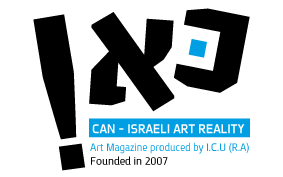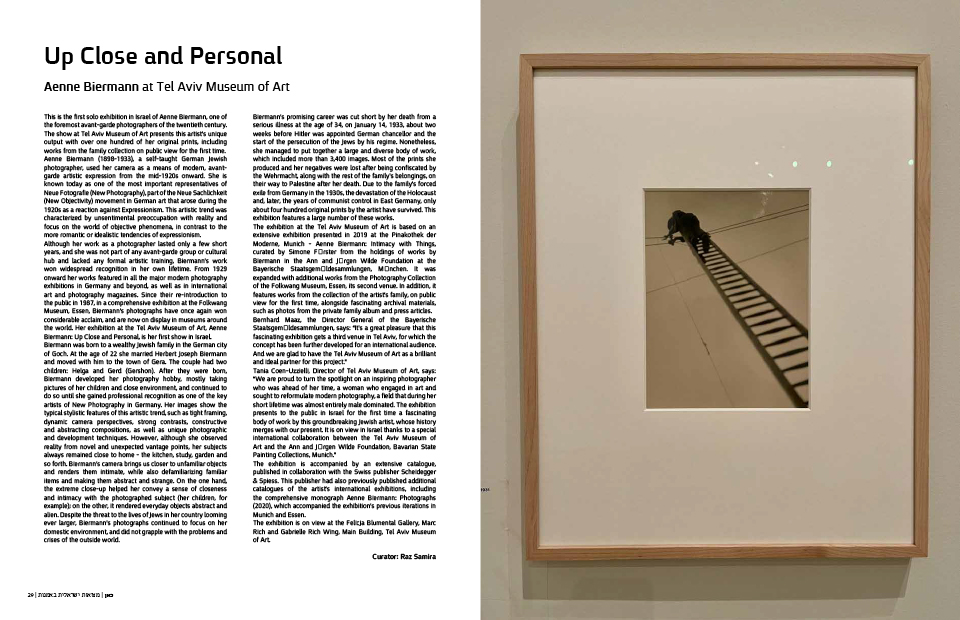
| Home Page | Editor Notices | Museums | Galleries | Publication | Donation | Contact Us |


 | |||||||||||||||
| |||||||||||||||


| |||||||||||||||
| Up Close and Personal / Aenne Biermann at Tel Aviv Museum of Art |
This is the first solo exhibition in Israel of Aenne Biermann, one of the foremost avant-garde photographers of the twentieth century. The show at Tel Aviv Museum of Art presents this artist’s unique output with over one hundred of her original prints, including works from the family collection on public view for the first time. Aenne Biermann (1898–1933), a self-taught German Jewish photographer, used her camera as a means of modern, avant-garde artistic expression from the mid-1920s onward. She is known today as one of the most important representatives of Neue Fotografie (New Photography), part of the Neue Sachlichkeit (New Objectivity) movement in German art that arose during the 1920s as a reaction against Expressionism. This artistic trend was characterized by unsentimental preoccupation with reality and focus on the world of objective phenomena, in contrast to the more romantic or idealistic tendencies of expressionism. Although her work as a photographer lasted only a few short years, and she was not part of any avant-garde group or cultural hub and lacked any formal artistic training, Biermann’s work won widespread recognition in her own lifetime. From 1929 onward her works featured in all the major modern photography exhibitions in Germany and beyond, as well as in international art and photography magazines. Since their re-introduction to the public in 1987, in a comprehensive exhibition at the Folkwang Museum, Essen, Biermann’s photographs have once again won considerable acclaim, and are now on display in museums around the world. Her exhibition at the Tel Aviv Museum of Art, Aenne Biermann: Up Close and Personal, is her first show in Israel. Biermann was born to a wealthy Jewish family in the German city of Goch. At the age of 22 she married Herbert Joseph Biermann and moved with him to the town of Gera. The couple had two children: Helga and Gerd (Gershon). After they were born, Biermann developed her photography hobby, mostly taking pictures of her children and close environment, and continued to do so until she gained professional recognition as one of the key artists of New Photography in Germany. Her images show the typical stylistic features of this artistic trend, such as tight framing, dynamic camera perspectives, strong contrasts, constructive and abstracting compositions, as well as unique photographic and development techniques. However, although she observed reality from novel and unexpected vantage points, her subjects always remained close to home – the kitchen, study, garden and so forth. Biermann’s camera brings us closer to unfamiliar objects and renders them intimate, while also defamiliarizing familiar items and making them abstract and strange. On the one hand, the extreme close-up helped her convey a sense of closeness and intimacy with the photographed subject (her children, for example); on the other, it rendered everyday objects abstract and alien. Despite the threat to the lives of Jews in her country looming ever larger, Biermann’s photographs continued to focus on her domestic environment, and did not grapple with the problems and crises of the outside world. Biermann’s promising career was cut short by her death from a serious illness at the age of 34, on January 14, 1933, about two weeks before Hitler was appointed German chancellor and the start of the persecution of the Jews by his regime. Nonetheless, she managed to put together a large and diverse body of work, which included more than 3,400 images. Most of the prints she produced and her negatives were lost after being confiscated by the Wehrmacht, along with the rest of the family’s belongings, on their way to Palestine after her death. Due to the family’s forced exile from Germany in the 1930s, the devastation of the Holocaust and, later, the years of communist control in East Germany, only about four hundred original prints by the artist have survived. This exhibition features a large number of these works. The exhibition at the Tel Aviv Museum of Art is based on an extensive exhibition presented in 2019 at the Pinakothek der Moderne, Munich – Aenne Biermann: Intimacy with Things, curated by Simone F?rster from the holdings of works by Biermann in the Ann and J?rgen Wilde Foundation at the Bayerische Staatsgem?ldesammlungen, M?nchen. It was expanded with additional works from the Photography Collection of the Folkwang Museum, Essen, its second venue. In addition, it features works from the collection of the artist’s family, on public view for the first time, alongside fascinating archival materials, such as photos from the private family album and press articles. Bernhard Maaz, the Director General of the Bayerische Staatsgem?ldesammlungen, says: “It’s a great pleasure that this fascinating exhibition gets a third venue in Tel Aviv, for which the concept has been further developed for an international audience. And we are glad to have the Tel Aviv Museum of Art as a brilliant and ideal partner for this project.” Tania Coen-Uzzielli, Director of Tel Aviv Museum of Art, says: “We are proud to turn the spotlight on an inspiring photographer who was ahead of her time, a woman who engaged in art and sought to reformulate modern photography, a field that during her short lifetime was almost entirely male dominated. The exhibition presents to the public in Israel for the first time a fascinating body of work by this groundbreaking Jewish artist, whose history merges with our present. It is on view in Israel thanks to a special international collaboration between the Tel Aviv Museum of Art and the Ann and J?rgen Wilde Foundation, Bavarian State Painting Collections, Munich.” The exhibition is accompanied by an extensive catalogue, published in collaboration with the Swiss publisher Scheidegger & Spiess. This publisher had also previously published additional catalogues of the artist’s international exhibitions, including the comprehensive monograph Aenne Biermann: Photographs (2020), which accompanied the exhibition’s previous iterations in Munich and Essen. The exhibition is on view at the Felicja Blumental Gallery, Marc Rich and Gabrielle Rich Wing, Main Building, Tel Aviv Museum of Art. Curator: Raz Samira Read more  |
| all rights reserved - CAN ISRAELI ART REALITY |
| סייבורג מחשבים - בניית אתרים |